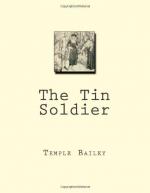Again the door opened, to frame a woman. She called and her voice was young.
“Dearest, it is late. Are you coming in?”
His young voice answered. His far-flung cigar-end trailed across the darkness, his eager steps gave quick response—the door was shut—.
“Oh, Derry, I’d call you like that—–”
“And I should come.”
The light went out on the lower floor, and presently in a room above a window was illumined.
THE SIXTH DAY
A dream house must have dream furniture. There are old shops in Alexandria, where, less often than in earlier years, one may find treasures, bow-legged chairs and gate-legged tables, yellowed letters written by famous pens, steel engravings which have hung in historic halls, pewter and plate, Luster and Sevres, Wedgwood and Willow, Chippendale and Hepplewhite, Adams and Empire, everything linked with some distinguished name, everything with a story, real or invented. One may buy an ancestor for a song, or at least the portrait of one, and silver with armorial bearings, and no one will know if you do not tell them that your heirlooms have come from a shop.
And Alexandria, as all the world knows, is reached from Washington by motor and trolley, train or ferry.
It was by ferry that the lovers preferred to go in the glory of this May morning, feeling the breeze fresh in their faces as with a motley crowd they stood on the lower deck and looked towards the old town.
Thus they came to the wharves, flanked by ancient warehouses in a straggly row along the water line. The windows of these ancient edifices had looked down on Revolutionary heroes, the old brick walls had echoed to the sound of fife and drum—the old streets had once been thronged by men in blue and buff. Since those days the quaint little city had basked in the pride of her traditions. She had tolerated nothing modern until within this very year she had waked to find that her red-coat enemy was now her friend, that the roads which George Washington had travelled were being trod once more by marching men; that in the church where he had worshipped prayers were being said once more for men in battle.
And into the shops, with their storied antiques, drifted now men in olive-drab and men in blue, and men in forester’s green, who laughed at the flint locks and powder horns, saluted the Father of his Country whenever they passed his picture, gazed with reverence on ancient swords and uniforms, dickered for such small articles as might be bought out of their limited allowances, and paid in the end, cheerfully, prices which would have been scorned by any discriminating buyer.
“There must be a table for the Log-Fire Room,” Jean told her husband, “and a fire-bench, not too high, and a big chair for you, and another chair for me—”
“And a stool for your little feet—.”




